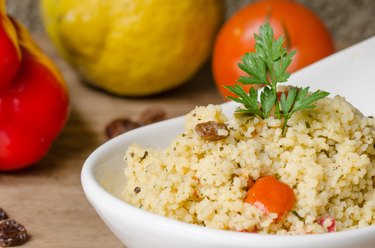
The Kemetic Diet refers to an eating plan adhered to by modern followers of Kemet, an ancient Egyptian set of religious rules that governed every aspect of its followers lives, from their spirituality to medical treatment to the foods they prepared for daily meals. Kemet has gained in popularity in recent years, along with the aspects of the Kemetic Diet which were detailed in a 2005 book by Muata Ashby. According to the eating plan detailed in the Kemetic Diet, certain foods should be eaten regularly, while others should be consumed only seldom or avoided completely to promote optimum health.
Kemet
Video of the Day
Kemet is the name that ancient Egypt was known by, and people who follow the cultural and religious practices of the ancient Egyptians are referred to as following Kemetics, or being members of the Kemetic Orthodoxy. According to the Kemet.org site, the modern practice of Kemetics began in the late 1980s and early 1990s with Hekatawy I, an Egyptian religious leader also known as Tamara Siuda. Modern Kemetics incorporates aspects of a wide variety of ancient religious practices from Africa, India and the Caribbean, including portions of the Yoruba and Vodou religions. These practices include detailed dietary rules known as the Kemetic Diet.
Video of the Day
The Kemetic Diet Guidelines
In "The Kemetic Diet: Food for Body, Mind and Soul, A Holistic Health Guide Based on Ancient Egyptian Medical Teachings," Muata Ashby outlined the modern precepts followers of Kemetics use for their diets. According to Ashby, one of the basic concepts that guided the ancient Egyptians was their belief that good health was more than an absence of disease symptoms, but rather something that could be promoted by treating food as a sacred spiritual connection to the gods and to their ancestors. To keep this connection intact and to prevent the development of diseases, followers of Kemet focus on eating staple foods in a set manner and avoiding other foods and eating habits.
Staple Foods
The Kemetic Diet dictates that an individual's staple foods -- the ones they eat on a daily basis -- should be vegetables and starches. The ideal starches are grains such as millet, corn, wheat or rice; beans or legumes such as lentils; and root vegetables like potatoes or yams. One of these starches, plainly cooked, should be part of every single meal, and should be accompanied by vegetables. According to Kemetic beliefs, vegetables must be eaten with starches in order for the starches to be digested properly. Fresh spices can be used as a seasoning. A typical staple food meal on the Kemetic Diet would include a vegetable-based sauce or broth flavored with spices and served on a cooked starch.
Occasional Foods
In the Kemetic Diet tradition, foods considered acceptable for occasional consumption are items that followers believe are beneficial in very small amounts but that strain the digestive system if eaten in large quantities. These foods include meat and any form of animal product such as dairy products and eggs; nuts; and fruit. Fish may be eaten more often than meat, but should still be kept as an occasional meal item. Followers of Kemet believe in consuming these foods more for medicinal purposes; for instance, fruit -- especially citrus fruit -- should be eaten if you are ill, and meat when a woman is pregnant. At no time, however, should these foods become regularly eaten staples.
Foods and Habits to Avoid
Followers of the Kemetic Diet believe that consuming processed foods, sugar, salt and any vitamin or mineral supplements leads to health problems and should be eliminated from the diet completely. Additionally, they contend that you should only eat when you are hungry, ideally two meals a day with one small meal in the morning and a larger meal in the evening, focusing on eating only a small variety of foods since, according to Kemetic followers, eating many different types of foods puts unnecessary strain on the digestive system.